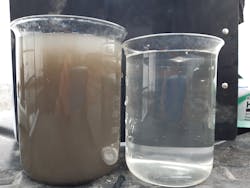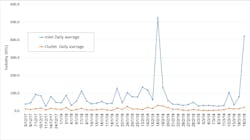Solids Separation in Surface Water Treatment
Surface water treatment facilities face the challenge of producing high quality clean water either for drinking, agricultural or industrial applications regardless of fluctuating turbidity and total suspended solids (TSS) inlet conditions. In order to meet the increasing demand for high quality and continuous supply of water, many water treatment plants will incorporate a solids separation step.
Solids Separation
Traditionally, most solids separation processes are being done by separation that is dependent on the density difference between the water and the particles. Since many particles have density that is very close to water, solids separation by density difference has to either work at very low velocity (0.5–1 m/hr), thus requiring a large footprint and associated cost, or float the particles in dissolved air flotation (DAF), which requires a high capital investment and is energy intensive.
Processes that remove particles using centrifugal forces exist in the market (e.g., Hydrocyclone), but they are very limited in the particle size separation (larger than 70 µm) and particle density (larger than 1.9 g/cc) and are mainly used for sand separation.
A New Hydrodynamic Separator
Natica is a recently developed hydrodynamic separator from AquaHD that is free from the limitations of the conventional solids separation processes. Natica works by creating centripetal hydrodynamic forces to separate particles under low pressure (1 bar). In Natica, the water is flowing through a dedicated circular structure, causing high level and efficient separation of the suspended particles. Unlike other traditional solutions, Natica removes a wide range of organic and inorganic suspended solids as small as 2 microns from water with dirt load of up to 4,000 PPM of TSS.
Technology Performance Validation
The performance of Natica was tested and evaluated in a demonstration plant that simulated a facility for treating surface water with high turbidity from the Jordan River for 93 days. The main goal of the test was to validate the capability of Natica to achieve more than 70 percent removal of turbidity and TSS. The second goal was to evaluate the performance of Natica as a buffer to the significant turbidity fluctuations in order to enable the granular filter media to operate properly and without interruption. The project was done with the support of Mekorot, Israel’s national water utility.
Results Summary
Natica provided acceptable and reliable turbidity values in the test, making it suitable for any surface water treatment application used for providing clean water with a quality that meets any client demands for either drinking water, industrial or agricultural needs. WW
Aqua HD has more than 60 years of experience in the field of international water purification. Learn more at aquahd.net.

